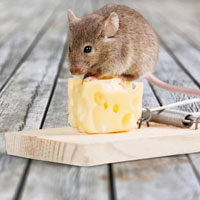Turn To The Experts At All Day Pest Control Omaha for Reliable Rodent Control Services in Omaha, NE. We Offer Residential Rodent Control And Commercial Rodent Control Solutions.
All Day Pest Control Omaha offers the best rodent control services in Omaha, NE to eliminate rodents. Rodents can be quite troublesome and cause significant damage if left unchecked. They're not only a nuisance but can also pose serious health hazards by spreading diseases and contaminating food supplies. Our Rodent Control Solutions are designed to eliminate rodents quickly and permanently, using humane methods that cause no harm or stress to the animals.

Rodent Control Near Me in Omaha, NE
Rodents can cause a lot of problems in your home or office, from contaminating food to causing structural damage. Not only are rodents a nuisance, but they can also be dangerous. Our team of experts offers Rodent Control Near Me in Omaha, NE that will get Rid Of All The Rodents in your home or office for good. They can carry diseases and parasites that can make you and your family sick. We use humane methods that are safe for both you and the animals. Call us at 877-724-3734 to schedule an appointment.
Rodent Pest Control in Omaha, NE
You've seen the horror movies. You know that if you have rodents in your home, you're in for a world of trouble. Not only are rodents unsightly and gross, but they can also be dangerous. Our Rodent Pest Control in Omaha, NE is the solution to your Rodent Problem. Our team of experts will get rid of the rodents and make sure they don't come back. We also offer a warranty on our Rodent Control Services so you can rest easy knowing your home is rodent-free.
Commercial Rodent Control in Omaha, NE
 Commercial rodent control is a specialized field, and many companies don't have the expertise to deal with rodents in a commercial setting. Our company provides safe, effective commercial rodent control in Omaha, NE that will get rid of rats and mice for good. We have Extensive Rodent Control Experience in this field, and our treatments are tailored specifically for commercial properties.
Commercial rodent control is a specialized field, and many companies don't have the expertise to deal with rodents in a commercial setting. Our company provides safe, effective commercial rodent control in Omaha, NE that will get rid of rats and mice for good. We have Extensive Rodent Control Experience in this field, and our treatments are tailored specifically for commercial properties.
Rodent Control Services in Omaha, NE
You have a rodent problem and you don't know what to do. Do you hear scratching or gnawing noises at night? That could be rodents inside your walls. Not only are they a health hazard, but they can also cause serious damage to your property. Our team of experts will identify the Source Of The Infestation and remove all of the rodents quickly and safely. Our Rodent Control Services in Omaha, NE is the answer. We also offer Comprehensive Squirrel Removal Services that will take care of your squirrel problem for good.
Residential Rodent Control in Omaha, NE
 Residential rodent control is a critical service for any homeowner, but it's often overlooked or considered unimportant. Rodents and mice can be destructive pests, causing serious damage to your home and putting your health at risk. We use the latest technologies and techniques to get the job done quickly and thoroughly. Our Team Of Professional Exterminators offers comprehensive Residential Rodent Control in Omaha, NE that will Eliminate These Pests from your home and protect your family's health.
Residential rodent control is a critical service for any homeowner, but it's often overlooked or considered unimportant. Rodents and mice can be destructive pests, causing serious damage to your home and putting your health at risk. We use the latest technologies and techniques to get the job done quickly and thoroughly. Our Team Of Professional Exterminators offers comprehensive Residential Rodent Control in Omaha, NE that will Eliminate These Pests from your home and protect your family's health.
Rodent Control Companies in Omaha, NE
Rats and mice can be a huge problem, not just because they're gross, but also because they can carry diseases. Not only are Rats And Mice Disgusting, but they can also carry dangerous diseases that can make you and your family sick. All Day Pest Control Omaha is the best Rodent Control Companies in Omaha, NE to get rid of rats and mice for good. We have the latest technology and Techniques For Rodent Control to ensure your home remains rat-free for as long as you live there.
